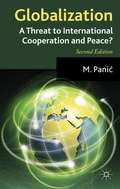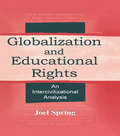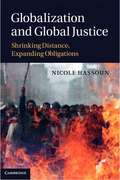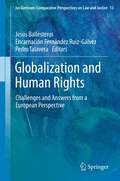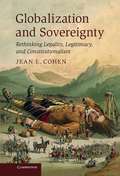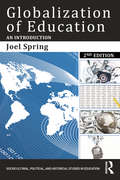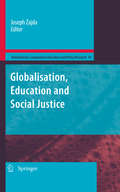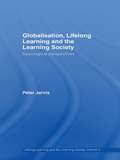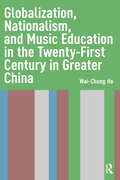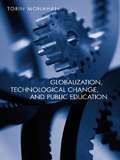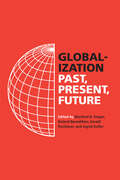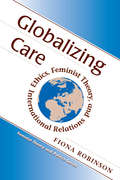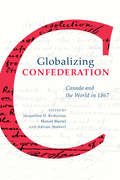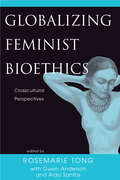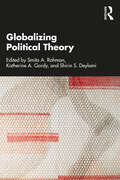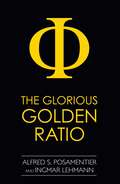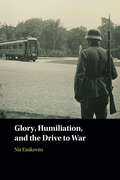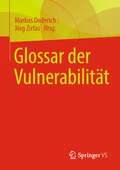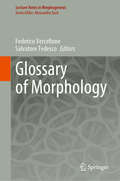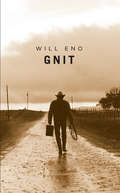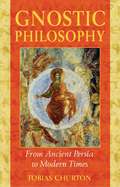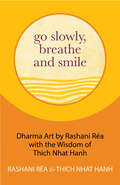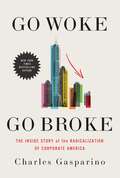- Table View
- List View
Globalization
by M. PanicGlobalization and National Economic Welfare makes an original, powerful and timely contribution to a highly topical issue that affects all countries by showing why globalization is unsustainable in the long term without fundamental changes in existing attitudes and institutions. The book analyzes one of the most important aspects of economic policy at the beginning of the twenty-first century: how to overcome the growing threat that inequalities created by globalization pose to economic progress and political stability both nationally and internationally. Economic problems, from corporate fraud and bankruptcies to the high social costs of the adjustments that globalization imposes on individual countries, are becoming increasingly international and, consequently, demand action at the supranational level. Yet the effective institutional framework for dealing with these problems remains national. In contrast to the neo-liberal approach, the author argues that the state, as the only form of organization that has the power to reconcile conflicts of interest nationally and internationally, has a critical role to play in ensuring that globalization does not end in failure and war.
Globalization and Educational Rights: An Intercivilizational Analysis (Sociocultural, Political, and Historical Studies in Education)
by Joel SpringThis is the first book to explore the meaning of equality and freedom of education in a global context and their relationship to the universal right to education. It also proposes evaluating school systems according to their achievement of equality and freedom. Education in the 21st century is widely viewed as a necessary condition for the promotion of human welfare, and thus identified as a basic human right. Educational rights are included in many national constitutions written since the global spread of human rights ideas after World War II. But as a global idea, the meaning of educational rights varies between civilizations. In this book, which builds on the concept of the universal right to education set forth in Spring's The Universal Right to Education: Justification, Definition, and Guidelines, his intercivilizational analysis of educational rights focuses on four of the world's major civilizations: Confucian, Islamic, Western, and Hindu. Spring begins by considering educational rights as part of the global flow of ideas and the global culture of schooling. He also considers the tension this generates within different civilizational traditions. Next, he proceeds to: *examine the meaning of educational rights in the Confucian tradition, in the recent history of China, and in the Chinese Constitution; *look at educational rights in the context of Islamic civilization and as presented in the constitutions of Islamic countries, including an analysis of the sharp contrast between the religious orientation of Islamic educational rights and those of China and the West; *explore the problems created by the Western natural rights tradition and the eventual acceptance of educational rights as represented in European constitutions, with a focus on the development and prominence given in the West to the relationship between schooling and equality of opportunity; and, *investigate the effect of global culture on India and the blend of Western and Hindu ideas in the Indian constitution, highlighting the obstacles to fulfillment of educational rights created by centuries of discrimination against women and lower castes. In his conclusion, Spring presents an educational rights statement based on his intercivilizational analysis and his examination of national constitutions. This statement is intended to serve as a model for the inclusion of educational rights in national constitutions.
Globalization and Global Justice
by Nicole HassounThe face of the world is changing. The past century has seen the incredible growth of international institutions. How does the fact that the world is becoming more interconnected change institutions' duties to people beyond borders? Does globalization alone engender any ethical obligations? In Globalization and Global Justice, Nicole Hassoun addresses these questions and advances a new argument for the conclusion that there are significant obligations to the global poor. First, she argues that there are many coercive international institutions and that these institutions must provide the means for their subjects to avoid severe poverty. Hassoun then considers the case for aid and trade, and concludes with a new proposal for fair trade in pharmaceutical and biotechnology. Globalization and Global Justice will appeal to readers in philosophy, politics, economics and public policy.
Globalization and Human Rights
by Jesús Ballesteros Encarnación Fernández Ruiz-Gálvez Pedro TalaveraGlobalisation turns out to be untenable because it does not guarantee minimum social equity, peace and respect for the environment, and therefore does not guarantee the effective accomplishment of human rights. This book analyzes this issue and raises proposals for a new perspective. The first part describes the soft threats to human rights, derived from the devaluation of the politics and the productive economy with regard to the finance. It entails the concealment of the reality in the shape of exploitation as the tax havens and in the shape of marginalization of the persons with different abilities. The second part include a study of hard threats to human rights and examines two cases of failed states: Afghanistan and Somalia, in which the violence has supplanted the politics and the economy. In view of these situations it is necessary to rethink the force of classic ius gentium and the humanitarian right. The third part presents the European Union as a legal and political space in which conditions of a worthy life are better defended by means of the Primacy of Practical Reason and Social State of Law, and by the requirement of peace as the main rule of international relations.
Globalization and Sovereignty
by Jean L. CohenSovereignty and the sovereign state are often seen as anachronisms; Globalization and Sovereignty challenges this view. Jean L. Cohen analyzes the new sovereignty regime emergent since the 1990s evidenced by the discourses and practice of human rights, humanitarian intervention, transformative occupation, and the UN targeted sanctions regime that blacklists alleged terrorists. Presenting a systematic theory of sovereignty and its transformation in international law and politics, Cohen argues for the continued importance of sovereign equality. She offers a theory of a dualistic world order comprised of an international society of states, and a global political community in which human rights and global governance institutions affect the law, policies, and political culture of sovereign states. She advocates the constitutionalization of these institutions, within the framework of constitutional pluralism. This book will appeal to students of international political theory and law, political scientists, sociologists, legal historians, and theorists of constitutionalism.
Globalization of Education: An Introduction (Sociocultural, Political, and Historical Studies in Education)
by Joel SpringContinuing Joel Spring’s reportage and analysis of the intersection of global forces and education, this text offers a comprehensive overview and synthesis of current research, theories, and models related to the topic. Written in his signature clear, narrative style, Spring introduces the processes, institutions, and forces by which schooling has been globalized and examines the impact of these forces on schooling in local contexts. Significant conceptual frameworks are added to this Second Edition, specifically the “economization of education,” “corporatization of education” and the “audit state.” These concepts are embedded in the global educational plans of major organizations such as the World Bank, the Organization for Economic Development and Cooperation (OECD), World Economic Forum, and multinational corporations. Globalization of Education, Second Edition features new and updated information on • The World Bank• OECD and the United Nations• The World Trade Organization and the Global Culture of Higher Education• Corporatization of Global Education• Religious and Indigenous Education Models• The Global Workforce: Migration and the Talent Auction• Globalization and Complex Thought
Globalization, Education and Social Justice
by Joseph ZajdaGlobalization, Education and Social Justice, which is the tenth volume in the 12-volume book series Globalisation, Comparative Education and Policy Research, presents up-to-date scholarly research on major discourses concerning global trends in education, social justice and policy research. It provides an easily accessible, practical yet scholarly source of information about the international concern in the field of social justice, globalisation, and policy research. Above all, the book offers the latest findings to the critical issues in education and social justice globally. It is a sourcebook of ideas for researchers, practitioners and policy makers in education, globalisation and social justice education reforms around the world. It offers a timely overview of current issues in social justice affecting education policy research in the global culture. It provides directions in education, and policy research, relevant to transformational educational reforms in the 21st century. The book critically examines the overall interplay between globalisation, education reforms, and social justice. It draws upon recent studies in the areas of globalisation, social justice education reforms and the role of the State. It explores conceptual frameworks and methodological approaches applicable in the research covering the State, globalisation, equity, education, and social justice. It demonstrates the neo-liberal ideological imperatives of education and policy reforms, and illustrates the way the relationship between the State and education policy affects current models and trends in education reforms for social justice and schooling globally. Various book chapters critique the dominant discourses and debates pertaining to the politics of social justice and education globally and the newly constructed and re-invented models of neo-liberal ideology in education and policy reforms. Using a number of diverse paradigms in comparative education research, ranging from critical theory to post-structuralist discourses, the authors, by focusing on globalisation, social justice and democracy, attempt to examine critically both the reasons and outcomes of education reforms and policy change for social justice. The volume offers a more informed critique on the Western-driven models of education reforms and implications for social justice. The book also draws upon recent studies in the areas of equity, cultural capital and dominant ideologies in education. The general intention is to make Globalization, Education and Social Justice available to a broad spectrum of users among policy-makers, academics, graduate students, education policy researchers, administrators, and practitioners in the education and related professions.
Globalization, Lifelong Learning and the Learning Society: Sociological Perspectives (Lifelong Learning and the Learning Society)
by Peter JarvisThis book critically assesses the learning that is required and provided within a learning society and gives a detailed sociological analysis of the emerging role of lifelong learning with examples from around the globe. Divided into three clear parts the book: looks at the development of the knowledge economy provides a critique of lifelong learning and the learning society focuses on the changing nature of research in the learning society. The author, well-known and highly respected in this field, examines how lifelong learning and the learning society have become social phenomena across the globe. He argues that the driving forces of globalisation are radically changing lifelong learning and shows that adult education/learning only gained mainstream status because of these global changes and as learning became more work orientated.
Globalization, Nationalism, and Music Education in the Twenty-First Century in Greater China
by Wai-Chung HoGlobalization, Nationalism, and Music Education in the Twenty-First Century in Greater China examines the recent developments in school education and music education in Greater China, Mainland China, Hong Kong, and Taiwan, and the relationship between, and integration of, national cultural identity and globalization in their respective school curriculums. Regardless of their common history and cultural backgrounds, in recent decades, these localities have experienced divergent political, cultural, and educational structures. Through an analysis of the literature, official curriculum documents, approved music textbooks, and a survey questionnaire and in-depth interviews with music teachers, this book also examines the ways in which policies for national identity formation and globalization interact to complement and contradict each other in the context of music education in respect to national and cultural values in the three territories.,Wai-Chung Ho's substantive research interests include the sociology of music, China's education system, and the comparative study of East Asian music education. Her research focuses on education and development, with an emphasis on the impact of the interplay between globalization, nationalization, and localization on cultural development and school music education.
Globalization, Technological Change, and Public Education
by Torin MonahanGlobalization, Technological Change, and Public Education documents the dramatic changes taking place in public education through the incorporation of new information technologies. These additions to the public school environment have generally been seen as enabling tools to help students and nations compete in the global marketplace. Yet a closer look at the interplay of technological change and organizational restructuring suggests the emergence of new, less promising power relations. Through detailed ethnographic research and interviews in the Los Angeles public school system, Torin Monahan reveals how, with few exceptions, these changes to the educational process are forcing both students and workers to adapt to systems that are ever more rigid and controlling.
Globalization: Past, Present, Future
by Manfred B. Steger, Roland Benedikter, Harald Pechlaner, and Ingrid KoflerA free ebook version of this title is available through Luminos, University of California Press’s Open Access publishing program. Visit www.luminosoa.org to learn more. Since the end of the Cold War, globalization—the process and the idea—has been reshaping the world. Global studies scholarship has emerged to make sense of the transnational manifestations of globalization: economic, social, cultural, ideological, technological, environmental, and postcolonial. But a series of crises in the first two decades of the twenty-first century has put the neoliberal globalization system of the 1990s under severe strain. Are we witnessing a turn toward "deglobalization," intensified by the COVID-19 pandemic and the war in Ukraine or a moment of "reglobalization," spearheaded by digital technology? The contributors to this book employ transdisciplinary research to assess past developments, the current state, and future trajectories of globalization in light of today’s dynamics of insecurity, volatility, and geopolitical tensions.
Globalizing Care: Ethics, Feminist Theory, and International Relations (Feminist Theory and Politics)
by Fiona Robinson<p>Although there is excellent work being done on ethics/normative theory and international relations and on gender/feminist theory and international relations, very little is available that seeks, explicitly, to integrate the two fields. Moreover, while feminist ethics, which explore the theory of care and noncontractual values such as trust and responsibility, are increasingly linked to political theory, there appears to be a reluctance to relate this moral theory to the specific questions of international or global political theory. <p>In Globalizing Care, Fiona Robinson successfully weaves feminist theory and ethics with international relations. By bringing in the important contributions of feminist moral and political theorists, contributions that are notably absent from most of the important work in this field, Robinson broadens the debate on normative theory in international relations. This text will be essential reading for students and scholars of gender or feminist studies, international relations, philosophy, and political theory and of special interest to scholars of feminist, moral, and political philosophy.</p>
Globalizing Confederation: Canada and the World in 1867
by Marcel Martel Jacqueline Krikorian Adrian ShubertGlobalizing Confederation brings together original research from 17 scholars to provide an international perspective on Canada’s Confederation in 1867. In seeking to ascertain how others understood, constructed or considered the changes taking place in British North America, Globalizing Confederation unpacks a range of viewpoints, including those from foreign governments, British colonies, and Indigenous peoples. Exploring perspectives from the Austro-Hungarian Empire, France, Latin America, New Zealand, and the Vatican, among others, as well as considering the impact of Confederation on the rights of Indigenous peoples during this period, the contributors to this collection present how Canada’s Confederation captured the imaginations of people around the world in the 1860s. Globalizing Confederation reveals how some viewed the 1867 changes to Canada as part of a reorganization of the British Empire, while others contextualized it in the literature on colonization more broadly, while still others framed the event as part of a re-alignment or power shift among the Spanish, French and British empires. While many people showed interest in the Confederation debates, others, such as South Africa and the West Indies, expressed little interest in the establishment of Canada until it had profound effects on their corners of the global political landscape.
Globalizing Feminist Bioethics: Crosscultural Perspectives
by Rosemarie Putnam TongGlobalizing Feminist Bioethics is a collection of new essays on the topic of international bioethics that developed out of the Third World Congress of the International Association of Bioethics in 1996. Rosemarie Tong is the primary editor of this collection, in which she, Gwen Anderson, and Aida Santos look at such international issues as female genital cutting, fatal daughter syndrome, use of reproductive technologies, male responsibility, pediatrics, breast cancer, pregnancy, and drug testing.
Globalizing Political Theory
by Smita A. Rahman Shirin S. Deylami Katherine A. GordyGlobalizing Political Theory is guided by the need to understand political theory as deeply embedded in local networks of power, identity, and structure, and to examine how these networks converge and diverge with the global. With the help of this book, students of political theory no longer need to learn about ideas in a vacuum with little or no attention paid to how such ideas are responses to varying local political problems in different places, times, and contexts. Key features include: Central Conceptual Framework: Introducing readers to what it means to “globalize” political theory and to move beyond the traditional western canon and actively engage with a multiplicity of perspectives. Organization: Focused on key topics essential for an introductory class aimed at both globalizing political theory and showing how political theory itself is a globalizing activity. Themes: Colonialism and Empire; Gender and Sexuality; Religion and Secularism; Marxism, Socialism, and Globalization; Democracy and Protest; and Race, Ethnicity, and Indigeneity. Pedagogy: Each chapter features theoretical concepts and definitions, political and historical context, key authors and biographical context, textual evidence and exegesis from the foundational texts in that thematic area, a list of discussion questions, and a list of resources for further reading. Committed to a multiplicity of perspectives and an active engagement between the global and the local, Globalizing Political Theory connects directly with undergraduate and graduate-level courses in political theory, global political theory, and non-western political thought.
Globalizing Political Theory
by Smita A. Rahman Shirin S. Deylami Katherine A. GordyGlobalizing Political Theory is guided by the need to understand political theory as deeply embedded in local networks of power, identity, and structure, and to examine how these networks converge and diverge with the global. With the help of this book, students of political theory no longer need to learn about ideas in a vacuum with little or no attention paid to how such ideas are responses to varying local political problems in different places, times, and contexts.Key features include: Central Conceptual Framework: Introducing readers to what it means to “globalize” political theory and to move beyond the traditional western canon and actively engage with a multiplicity of perspectives. Organization: Focused on key topics essential for an introductory class aimed at both globalizing political theory and showing how political theory itself is a globalizing activity. Themes: Colonialism and Empire; Gender and Sexuality; Religion and Secularism; Marxism, Socialism, and Globalization; Democracy and Protest; and Race, Ethnicity, and Indigeneity. Pedagogy: Each chapter features theoretical concepts and definitions, political and historical context, key authors and biographical context, textual evidence and exegesis from the foundational texts in that thematic area, a list of discussion questions, and a list of resources for further reading. Committed to a multiplicity of perspectives and an active engagement between the global and the local, Globalizing Political Theory connects directly with undergraduate and graduate-level courses in political theory, global political theory, and non-western political thought.
Globetrotting or Global Citizenship?
by Robert Huish Rebecca TiessenGlobetrotting or Global Citizenship? explores the broad range of international experiential learning options available to Canadian students, as well as the opportunities and the ethical dilemmas that come with them. Combining practical advice with critical examinations of international experiential learning, this essay collection is designed to help the reader to move beyond photo-ops and travel opportunities and towards striving for a deeper global citizenship.Globetrotting or Global Citizenship? is a valuable guide for students considering going abroad for experiential learning and a useful resource for those returning from such programs, as well as instructors and administrators facilitating pre-departure and return orientation sessions. Anyone taking part in international volunteering will find the reflections and analysis provided here an excellent starting point for understanding the potential impact of their time abroad.
Glorious Golden Ratio
by Alfred S. Posamentier Ingmar LehmannWhat exactly is the Golden Ratio? How was it discovered? Where is it found? These questions and more are thoroughly explained in this engaging tour of one of mathematics' most interesting phenomena. The authors trace the appearance of the Golden Ratio throughout history, demonstrate a variety of ingenious techniques used to construct it, and illustrate the many surprising geometric figures in which the Golden Ratio is embedded. Requiring no more than an elementary knowledge of geometry and algebra, the authors give readers a new appreciation of the indispensable qualities and inherent beauty of mathematics.
Glory, Humiliation, and the Drive to War
by Nir EisikovitsFrom Hitler's determination to erase Germany's disgrace after World War I, to Sadat's promise to undo Egypt's humiliation in 1967, to ISIS's proclamations that it would end the “emasculation” of Muslims and restore the glory of the Caliphate, a sense of political humiliation and a desire for martial glory have always been central in the drive to war. Yet although glory and humiliation are the twin engines of conflict, and together they spur individuals and nations to violence, philosophers have shown little interest in these dispositions. In this book Nir Eisikovits offers a philosophical account of political humiliation, martial glory, and the relationship between them. Drawing on philosophy, literature, and psychology, Eisikovits argues that it is impossible to understand why people are drawn to war and how wars are justified without making sense of these two political passions and the ways in which they inflame each other.
Glossar der Vulnerabilität
by Jörg Zirfas Markus DederichDieses Glossar unternimmt den ersten Versuch, das semantische Feld des Begriffs ‚Vulnerabilität‘ einzugrenzen und die mit ihm verbundenen heterogenen Phänomene in ihren Überlappungen und Wechselwirkungen kenntlich zu machen. Das Glossar ist dabei an einem anthropologischen, phänomenologischen und pragmatischen Verständnis von Vulnerabilität orientiert. Dargestellt und analysiert werden Phänomene, Ursachen und Folgen unterschiedlicher Formen von Vulnerabilität aus unterschiedlichen disziplinären Zugängen. Neben der Vielschichtigkeit und Komplexität und neben den problematischen und positiven Momenten von Vulnerabilität kommen auch pädagogische Möglichkeiten zur Sprache, diese zu bewältigen und zu gestalten.
Glossary of Morphology (Lecture Notes in Morphogenesis)
by Federico Vercellone Salvatore TedescoThis book is a significant novelty in the scientific and editorial landscape. Morphology is both an ancient and a new discipline that rests on Goethe's heritage and re-forms it in the present through the concepts of form and image. The latter are to be understood as structural elements of a new cultural grammar able to make the late modern world intelligible. In particular, compared to the original Goethean project, but also to C.P. Snow's idea of unifying the “two cultures”, the fields of morphological culture that are the object of this glossary have profoundly changed. The ever-increasing importance of the image as a polysemic form has made the two concepts absolutely transitive, so to speak. This is concomitant with the emergence of a culture that revolves around the image, attracting the verbal logos into its orbit. Incidentally, even the hermeneutic relationship between past and present relies more and more on the image, causing deep changes in cultural environments. Form and image are not just bridging concepts, as in the field of ancient morphology, but real transitive concepts that define the state of a culture. From the Internet to smartphones, television, advertising, etc., we are witnessing – as Horst Bredekamp observes – an immense mass of images that fill our time and affect the most diverse areas of our culture. The ancient connection between science and art recalled by Goethe emerges with unusual evidence thanks to intersecting patterns and expressive forms that are sometimes shared by different forms of knowledge. Creating a glossary and a culture of these intersections is the task of morphology, which thus enters into the boundaries between aesthetics, art, design, advertising, and sciences (from mathematics to computer science, to physics, and to biology), in order to provide the founding elements of a grammar and a syntax of the image. The latter, in its formal quality, both expressive and symbolic, is a fundamental element in the unification of the various kinds of knowledge, which in turn come to be configured, in this regard, also as styles of vision. The glossary is subdivided into contiguous sections, within a complex framework of cross-references. In addition to the two curators, the book features the collaboration of a team of scholars from the individual disciplines appearing in the glossary.
Gnit
by Will Eno"The marvel of Mr. Eno's new version is how closely it tracks the original while also being of the very moment and an unmistakably Will Eno play. After climbing the craggy peaks of Ibsen's daunting play, Mr. Eno has brought down from its dizzying heights a surprising crowd-pleasing (if still strange) work." - Charles Isherwood, New York Times"Gnit is classic Will Eno. By that I mean I was thrilled by it." - TimeOut Chicago"If ever a play made me want to be a better person, this is it." - Bob Fischbach, Omaha World-HeraldPeter Gnit, a funny enough, but so-so specimen of humanity, makes a lifetime of bad decisions on the search for his True Self. This is a rollicking yet cautionary tale about (among other things) how the opposite of love is laziness. Gnit is a faithful, unfaithful and willfully American misreading of Henrik Ibsen's Peer Gynt (a nineteenth-century Norwegian play), written by Will Eno, who has never been to Norway.Will Eno's most recent plays include The Open House (Signature Theatre, New York, 2014; Obie Award, Lucille Lortel Award for Best Play) and The Realistic Joneses (Yale Repertory Theatre, New Haven, 2012; Broadway, 2014). His play Middletown received the Horton Foote Prize and Thom Pain (based on nothing) was a finalist for the 2005 Pulitzer Prize. Mr. Eno lives Brooklyn.
Gnostic Philosophy: From Ancient Persia to Modern Times
by Tobias ChurtonAn extensive examination of the history of gnosticism and how its philosophy has influenced the Western esoteric tradition • Explains how the Gnostic understanding of self-realization is embodied in the esoteric traditions of the Rosicrucians and Freemasons • Explores how gnosticism continues to influence contemporary spirituality• Shows gnosticism to be a philosophical key that helps spiritual seekers "remember" their higher selvesGnosticism was a contemporary of early Christianity, and its demise can be traced to Christianity's efforts to silence its teachings. The Gnostic message, however, was not destroyed but simply went underground. Starting with the first emergence of Gnosticism, the author shows how its influence extended from the teachings of neo-Platonists and the magical traditions of the Middle Ages to the beliefs and ideas of the Sufis, Jacob Böhme, Carl Jung, Rudolf Steiner, and the Rosicrucians and Freemasons. In the language of spiritual freemasonry, gnosis is the rejected stone necessary for the completion of the Temple, a Temple of a new cosmic understanding that today's heirs to Gnosticism continue to strive to create.The Gnostics believed that the universe embodies a ceaseless contest between opposing principles. Terrestrial life exhibits the struggle between good and evil, life and death, beauty and ugliness, and enlightenment and ignorance: gnosis and agnosis. The very nature of physical space and time are obstacles to humanity's ability to remember its divine origins and recover its original unity with God. Thus the preeminent gnostic secret is that we are God in potential and the purpose of bona fide gnostic teaching is to return us to our godlike nature.Tobias Churton is a filmmaker and the founding editor of the magazine Freemasonry Today. He studied theology at Oxford University and created the award-winning documentary series and accompanying book The Gnostics, as well as several other films on Christian doctrine, mysticism, and magical folklore. He lives in England.
Go Slowly, Breathe and Smile: Dharma Art by Rashani Réa with the Wisdom of Thich Nhat Hanh
by Thich Nhat Hanh Rashani RéaA Book of Mindfulness, Kindfulness, and Words of Wisdom“Rashani’s extraordinary collages perfectly mirror Thich Nhat Hanh’s simple yet powerful teachings. An exquisite collection.” —James Baraz, author of Awakening Joy#1 New Release in Zen Philosophy, Stress Management, Meditation, and Mental & Spiritual HealingThich Nhat is a spiritual luminary, second only to the Dalai Lama, and is globally renowned and admired. His words of wisdom are centralized in finding peace in every moment; whether you’re stopped at a red light or answering a phone, mindfulness grounds you into the present moment.Start your day with these peaceful, empowering words of wisdom. All of these words are interwoven with meditative, inspiring images of celebration. Each page is designed to increase positive thinking and improve your mental health.Life-changing mindful meditations. Strengthen your mindset with these empowering words of wisdom that are referenced as essential advice for how to grow spirituality and mentally strong. Meditation practices are essential to building mindfulness.Go Slowly, Breathe and Smile is a unique convergence of wisdom and art, a beautiful tribute from a dedicated student to her teacher. Absorb Thich Nhat Hanh's words of wisdom and meditate on Rashani Réa's inspirational collages, and allow these pages to illuminate your heart and mind, inspire mindfulness, and reduce stress levels.Read Go Slowly, Breathe, and Smile and find:Encouraging words of advice from the Wisest Monk Thich Nhat HanhWords of wisdom to thrive in the mind and bodyBeautiful art by social activist Rashani RéaLife lessons and tools for mindful meditationsThich Nhat Hanh’s other books include the bestselling Peace Is Every Step; No Mud, No Lotus; and How to Love. Rashani Réa's other books include Nurses Cry Too and The Threshold Between Loss and Revelation. If you liked The Heart of the Buddha's Teaching, or The Miracle of Mindfulness, you’ll love Go Slowly, Breathe and Smile.
Go Woke, Go Broke: The Inside Story of the Radicalization of Corporate America
by Charles GasparinoA New York Times bestselling author and veteran Fox Business financial journalist&’s explosive deep-dive into the progressive madness that has infected and corrupted the world&’s biggest corporations, threatening the stability of the global economy—and life as we know it. How did a bunch of rich dudes who run corporate America become the tools of left-wing radicals? Intimidated by activists on the left, virtually every major corporation in America has embraced woke politics. For years, these businesses could get away with progressive virtual signaling without worrying about alienating customers. Then the anti-woke counter-offensive movement arrived. As high-profile, disastrous backlashes at companies like Anheuser-Busch, Disney, Target and other companies reveal, companies who cave to the demands of left-wing social justice activists are being punished like never before. Customers are fighting back and taking their money elsewhere. In Go Woke, Go Broke, New York Times bestselling author and veteran financial journalist Charles Gasparino calls out the nonsense and takes readers inside the radicalization of corporate America, based on numerous insider interviews and exclusive reporting. The story is wilder than you can imagine. Gasparino introduces readers to America&’s most woke corporate leaders, tracing the origins of ESG and "stakeholder investing.&” He takes readers along on for a rollicking ride through corporate America as he shines a light, unlike anyone else, on Fortune 500 companies that have suffered for caving to the silly and irresponsible demands of social justice activists and left-wing interests. A respected financial reporter who has covered finance for more than 30 years, Gasparino is deeply sourced and has dug into countless episodes involving Wall Street greed, corporate hubris, and government overreach in enterprise. This explosive, untold story and in-depth examination of the seminal players, institutions, and forces of the markets shows that, for the sake of global stability, we must immediately pry the clenched fists of radical activists off the levers of the economy.
